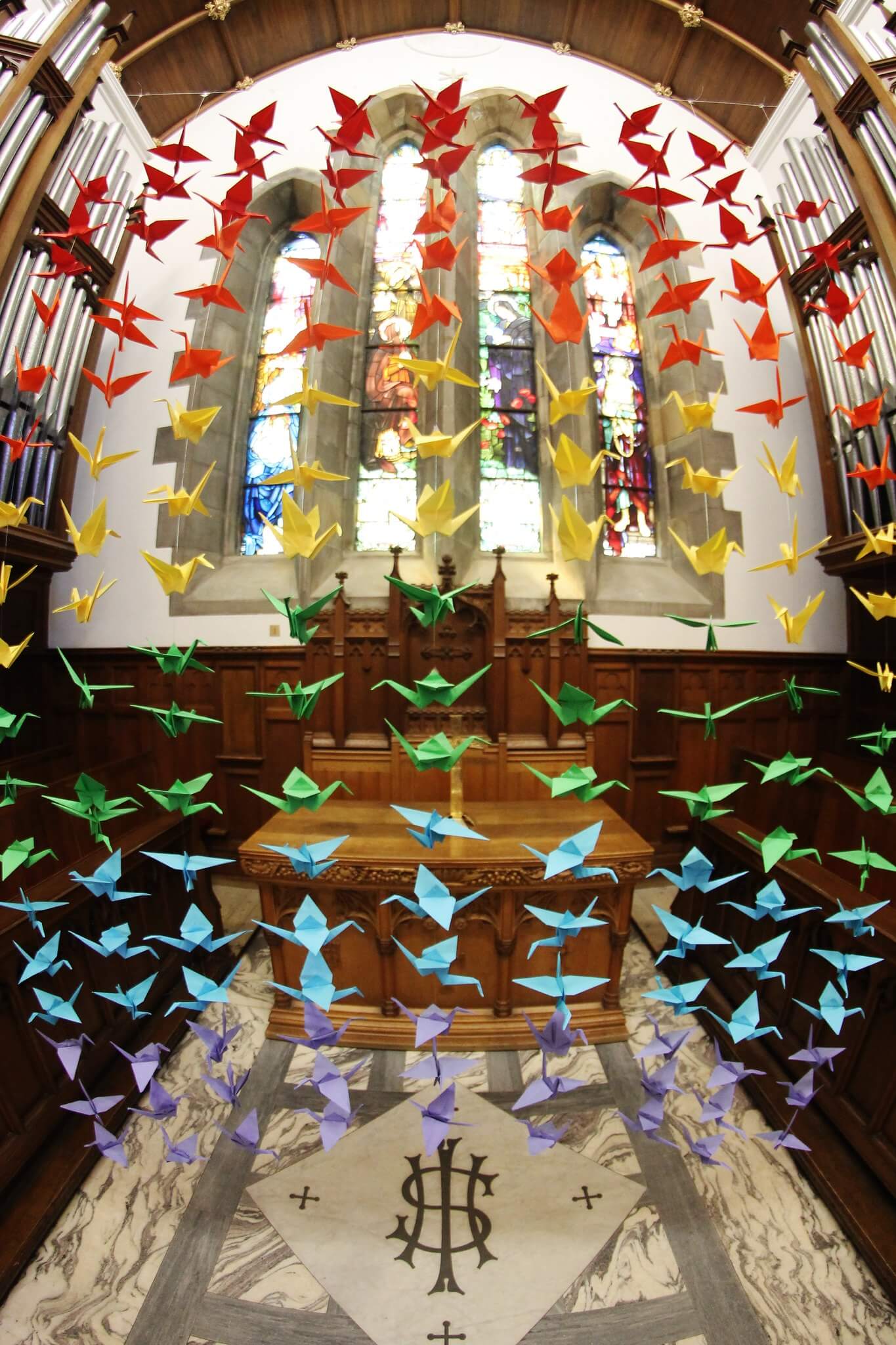“the word of god” and “the church of god” the NfiCKSSARV
MEANS OF SALVATION.
St. John, XV, 5.
” I am the Vine, ye are the branches. He that abideth in Me and I in him,
the Bame bringeth forth much fruit, for without Me yc can do nothing.”
I have lately expressed, with such clearness of thought
and diction as I am able to command, my own conviction,
that there is little real practical readiness amongst us for
the coming of the Lord — that though He may be at hand,
even at the door, the whole tone of our devotion is miser-
ably low — that there is p, terrible spirit of utter worldliness
rife around us — that we shrink painfully from the thought
self-denial and entire consecration to the service of our Lord ;
that any nnusual earnestness and devotedness of life when
it is met with, tends to excite ridicule, when it does not
29
call forth censure and opposition. For now well nigh
thirty years I have been brought into close ■ ontact with
the ordinary mind in sacred things, and the conclusion is
often forced upon me that there is something in the whole
tone of popular Christianity so unlike its primitive pattern —
60 different from that literal representation of it which we
find in Holy Scripture, that the two are hardly to be
recognized as being the same even in many of their leading
principles.
When, on all sides, instead of living as brethren in the
same blessed household of faith — instead of dwelling to-
gether in unity, and with one mind and one mouth glorifying
God, even the Father of our Lord Jesus Christ, we find bit-
ter strife and heartburnings, rife among the professed fol-
lowers of thePrince of Peace, separations and divisions of the
most aggravated character, growing out of causes the most
trivial and insignificant, controversies and j anglings about
opinions drawn by private interpretation from the Scrip-
tures—opinions which are diametrically the opposites ot
each other, and which being absolutely beyond the possi-
bility of reconciliation, cannot possibly be true. When I
say this spectacle is everywhere, and every day to be met
with, I confess that to me it is no great wonder that many
sincere people begin to doubt, whether Christianity (as they
see and understand it) is really the divine and blessed thing
which it is said to be. And I am ready further to acknow-
ledge, that my sorrow has been greater than my surprise
when, in going from door to door in this town, I have been
told by intelligent men, generally of the artizan class, (a class
who, though they may not have the opportunity of gaining
large views on such subjects, exercise a considerable amount ot
independent tlio..ght) to be told, I say, by such men, that be-
fore I undertook to instruct them in the truths of the Bible,
it would be well to assemble the teachers of the eighteen or
<0 twenty ” denominations ” into whicli christians are here di- ivided, each holding opinions conflicting with all the othersi and when as the result of our conference we had come to a un- animous agreement as to what the Bible meant, tJien it would be time enough to commence the work of their instruction. And what is this but the perfectly legitimate result of the Hcentious exercise of incompetent private opinion, leading to the reception or formation of those traditions, i.e.^ those ex- planations of the Word of God, which make it of none effect, either by obscuring its meaning or utterly explaining away its true and literal sense. Now, (as on Sunday last I sought to show) this conflict of opinion, destroying as it does all cer- tainty as regards truth, grows naturally and inevitably from the fact, that men, popularly speaking, have gradually lost all idea of the continued, outward, visible existence of that divine and spiritual kingdom which the God of Heaven was to set up on earth, and which should never be de- Btroved. The true vine — of which our Lord is the root — — ^His body mystical, the church — the trunk, and we who by holy baptism have been grafted into it — the branches — the Church of the living God, which is the pillar and ground of the truth. They have substituted for it, societies of their own formation, whose origin features, history and fate prove them to be purely human, and not divine : The ” Churches ” of men, but not ” t?ie Church of the living God.’* With this wide-spread loss of all scriptural notion of the Church, there necessarily follows the loss of all idea of her oflice as the keeper, the witness, and the divinely-appointed inter- preter of Holy writj and the result is that men, trying to understand the Bible by their own unaided power have to a great extent failed to do so, and have put almost as many different and conflicting meanings upon it as there are different minds. They have attempted to attain a most n of important end, but they have left out one element which is essentially necessary to the success of their attempt. The truth which Almighty God revealed by His blessed Son — the Faith which was once for all delivered to the saints — and by the heartfelt reception and practice of which we are to have our Lord come among us by a spiritual ad- vent, and so to incorporate His strength with our weakness, as to help us against our own sins and wickedness, was to be preserved pure, unadulterated, and unchanged by the proper and perpetual use of two of God’s most precious gifts to us — firet, the “Word of God, kept and explained by the other great gift, viz., the Church of God. Men in their self-suf- ficiency have chosen to make the foolish and futile attempt of securing this great end by the use of one of these means only, and the result is, the confusion, uncertainty and con- tradiction ; the alienation and bitterness of spirit which now BO painfully distinguishes popular Christianity. When Almighty God has ordained two mean’s, both of which are, by His appointment, essential to the attainment of any specific end, whether temporal or spiritual, and men either in ignorance or self-sufficiency choose to use only one, then they have no one but themselves to blame for any unhappy conspquences which may arise, because it is clearly the fruit of their own voluntary action. Our bodily life, e.ff., is supported by two means — food and drink. Both of these, in due proportion and combination, are es- sential to our healthy existence. If we used one of them only, then, irrespective of the evil consequences following directly from the loss of the other, the one of which we did partake, and which was intended to promote our welfare would produce, from want of combination with the other, results of the most distressing and fatal character. Scien- tific men can easily prove to us that the air we breathe and which is so proverbially necessary to our life, is com- * •>
32
pounded chiefly of two ingredients, which arc easily separ-
able. If we were to breathe one only of the elements of
which it is composed, suffering and death would be the
consequence. It is only when the two are properly com-
bined that tho end is secured, viz.. the maintenance of life.
Now it has pleased God that our spiritual life should also
be supported by the combination of two divine ingredients,
viz., the Word of God and the Church of God. If we
separate the two — if we destroy their combination by using
them in a manner which God did not intend, then from
the use ot one, however honestly or devoutly used, we shall
not obtain, and it is vain for us to expect to obtain, those
beneficial results which would flow from the right use of
both in combination.
This is not a mere theory, but a fact which really admits
of no question.
For the proof of it, look first to the large and numerous
Non-conformist bodies who have forsaken the ancient and
historic Church, and set up the various organizations which
they, in the exercise of their private judgement think,
strangely enough, to be more in accordance with the mind
of Christ than the Church founded by Himself. They
take one of the two elements necessary for our salvation,
viz., the Word of God ; and no one, unless lost to all sense
of christian candour, can doubt the earnestness, honesty and
deep devotedness with which it is used by multitudes am®ng
them ; but the aggregate result of their attempts to inter-
pret the Word of God without the Church of God, is that
almost infinite diversity of conflicting views which has
been referred to, and which is producing in many minds
very grave doubts as to the truth of christianit}’- itself. Look
now at the Roman branch of the Church. She professes great
reverence for the Word of God, but practically she has
taken it away from the people, and thus they, having to a.
great oxtont only the Chur;!li of God, suffer the inevitable
consequence of separating what God has joined together in
those assumptions, corruptions and novelties which at this
moment form the greatest obstacle to the re-union of
Ohristondom, on the principles of the Primitive and Catholic
Faith. • ,. • … •’
And now let us see where we have got to. A sound
faith, even that faith which was delivered to the saints, is
essential to a holy life ; but this faith, as far as we can see,
could not possibly have been maintained amidst this evil
world without ” the Word of God.” But even the Word
of God would not answer its purpose, unless its inie 7}uaning
was preserved, and, therefore, for this purpose, the Church
of God was constituted its authorized interpreter, an office
she discharges in the manner and under the limitations and
condition* which I endeavored to explain on Sunday even-
ing last.
Some persons who have not thought much on these sub-
jec^i, and who, without thought, are willing to accept as
correct any crude theory which may happen to prevail
around tliem, may perhaps be shocked to hear it said that
anything is needful for our spiritual welfare but the Bible,
ai. ^ the Bible alone. “Are not the Scriptures,” such people
say, ” able to make us wise unto salvation, through faith,
in Christ Jesus, and what can we want more than that ?
Does not Christ dwell in the heart by faith, which is the
gift of God, and if so, why thus attempt to magnify the
office of the Church ? ” The reply to these questions is
very simple, and it is this : that the Bible itself, human
experience and common sense combined, serve to shew, that
without the Church of God, the Word of God could not be
obeyed. “Wlio, that has any trace of christian earnestness
within him, but knows and feels that we arc sore let and
Jiindcred in running the race that is set before us, by reason
c
34
of oar own sirva and wickedness ? Who lias not been dis-
tressed and cast down by the sense of his own weakness to
overcome what is evil, produced by the breaking of his
Btrongest resolutions against it ? Who is insensible to his
own coldness and deadness in prayer, and to his want ot
deep, conscious, constraining love to Christ ? Now who
can save us from ourselves but Him, and Ijow is He to do
it unless Ho raises up Ilia power and comes among us —
yea, into us — and with great might sucours us^? And how
is that succour given but by union with Him ; by His mak-
ing: Himself one with us, so that we’ who, severed from Him
can do nothing, may be enabled to do all things through
Christ, that stre;igthenetli us ? Now, if the Holy Scriptures
teach us anything distinctly, it is that this union is brought
about by the instrumentality of those means of grace which
Christ Himself appointed for this very end, and which are
administered only in and by His Church. How were the
first believers added to the church ? How grafted into the
True Vine, from Whom alone they could derive the spiritual
life which was to makt them fruitful in holiness — how but
by being baptized into Christ, and thus, as St. Paul says,
” putting on Christ.” And how is the union, or incorpora-
tion thus effected to be maintained or kept up, but by
worthy and continual participation in that heavenly food
which makes or keeps us one with Christ — ” He that eateth
My flesh and drinketh My blood dwelleth in Me and I in
him.” Our Lord in Holy Scripture commands us to ob-
serve these His ordinances ; but to obey these precepts of
” the Word of God ” we must have ” the Church of God,”
for nowhere else can we be sure of finding either baptism
or the supper of the Lord, both “of which are generally
necessary to salvation. It will not do to say that ftiith
alone will suffice, for a faith which does not.|lead to obedi-
ence is a dead faith. The faith of the 3,000 converted by
J)
St. Peter led them immediately to be baptized, and so with
all those of whom we read in the Holy Scriptures. But this
could not have been, unless there had been the duly com-
missioned officers of the Church, authorized to baptize them,
and afterwards to break to them the bread of life in the
Holy Eucharist. Is anyone allowed to do these things ‘<
surely not. Only those whom our Lord sent, and com-
missioned to send others, saying ” Go ye and baptize — go
YE and teach.” As long, my christian brethren, as the
Bible lasts, it will be a vain attempt to ignore the Church,
and suppose that any half dozen people who choose to as-
semble together can, if they please, constitute themselves
into a society for the administration of God’s sacraments.
Men could just as easily make a new Bible as a new Church.
She is not of human, but of heavenly workmanship. She is
as a ship sailing over the sea of this evil, stormy world,
amid whose wild waves of sin and unbelief the souls of men
are perishing. Christ, by His ministei*s within the ship,
throws — so to speak — the rope of His ordinances to those
struggling in the waters, in hope of saving them. Faith is
the hand by which they lay hold upon this rope : a: id thus
we see why it is that without faith we cannot be saved, for
without it we can no more be drawn to Christ than a
drowning man could, without hands, grasp the rope thrown
to him in the waters. Christ is our only Saviour. We,
notwithstanding all our provocations, are the sinners who,
at the price of His most precious blood, He vouchsafes to
save, and the means or instruments by which it pleases
Him to save us are those ordinances which He has appoint-
ed in His church for this very end. iJe might, if He had
BO pleased, have appointed a thousand other means of bring-
ing us into union with Himself; but He in His love and
wisdom, has not seen fit to do so, and it will not do for us
to neglect His ways for others of our own devising. God’s
86
Word and God’s Church are the means appointed for our sal-
vation, and it is by the loving, trusting, reverent and de-
vout use of both that we are alone warranted in believing
that we shall really be ready for the judgment of the great
dav. It is because we fail to understand and to use both?
that Christianity displays the melancholy spectacle which it
now exhibits, and that the standard of our spiritual life is
so wretchedly low and stunted.
We, who through God’s great mercy have been led to a
fuller, firmer grasp of these truths, have a high mission to
fulfil, though its nature is often grotesquely misunderstood.
People look at our love for the decencies of divine worship,
at our efforts to adorn the house of prayer, or to bear our-
selves devoutly in the presence of the Most High, and they
think and say that these outward things are all we care for-
They seem incapable of comprehending +hat these things
are but the outermost fringe of our inner life, the mere
trivial external indications of our having, through God’s
grace, been awakened to the unspeakable importance of an
awfully forgotten part of God’s eternal Truth. The great
mission which has been divinely committed to us is to
make men recoajnize the srreat fact that the means bv
which we are to be brought into union, and kept in real close
living communion with the Lord, is through the instrument-
ality of His Body the Church. Men at this day profess to value
the Word of God ; but losing, as they have done, its true
meaning, they begin to doubt its authority, and it is our
work to make them see that in the Church of God we have a
divinely authorized inter} ncter of the Word of God, and that
by the combined action of both we are to be saved from error
of doctrine, and viciousness of life, and made ready for
the day of judgment. We shall be (as we are) denounced
and suspected, feared, and calumniated, as was our
Master of old, but we sJmU succeed as surely as truth gains
37
IS
the victory in its conflict with error ; as certainly as the
brightness of the day banishes the obscurity of night. And
now one word only to those who sympathize with us in oar
work. Let not your sympathy be a merely intellectual one.
Let us by our spirit, our life, our actions, show beyond all dis-
pute, that this movement is deeply, truly, earnestly religious.
Oh, I dread, in my own case, and in the case ot others, a
mere assent, a mere mental recognition of the truth, that our
loving Lord is yet among us by His Mystical Body, and that
it should have no effect on our hearts and conduct. O ye,
who know that you are bronchos in the True Vine, see that
ye so abide in Him, that ye bring forth much fruit. Let
your love for His church lead you to prove its sincerity, by
following the holy footsteps of His life Who is Her Head and
Lord ; and thus shall we hasten the blessed day, when
t’nere shall be one Fold and one Shepherd, and when Zion
shall be built as a city that is at unity in itself.







